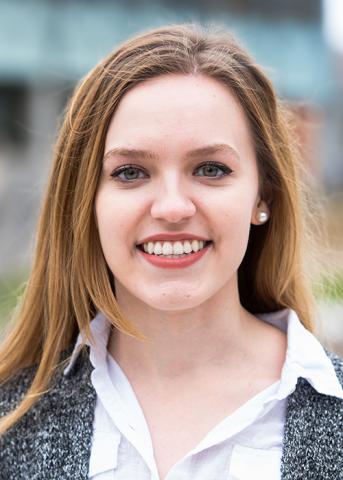Kate Tokareva graduated in 2019 and is attending the UW School of Medicine.
How did you discover public health?
I came to public health in a roundabout way. My mom works at Swedish Medical Center as a sonographer, so I was exposed to hospitals at a young age. I enjoyed listening to her stories about patient interactions and always looked forward to tagging along with her. I was on the pre-med path when I got to college, which was a good fit, but I found that the introductory science classes were notoriously big and competitive.
Being outdoors in nature is important to me, so I wanted to incorporate that passion into my educational studies. I thought about majoring in environmental science and conservation biology, but what was missing was that connection to human health. That’s when I discovered environmental health.
What do you find most interesting about environmental health?
I’m particularly interested in climate change and how it affects health outcomes. For example, extreme heat can lead to more frequent wildfires, which can contribute to higher incidences of respiratory problems. My studies in climate change and health have also made me acutely aware of the concept of environmental justice and how communities that contribute least to the problem often end up experiencing the most severe consequences.
What sort of work do you do with the Center for Health and the Global Environment?
Under Drs. Kristie Ebi and Jeremy Hess, I assist in literature searches and reviews that support their publications on climate change and health. Currently, I’m looking for articles that show associations between micronutrients, vitamins and the microbiome. In the spring, I will be assisting on a project that involves researching country profiles for small island developing states in the Western Pacific Region as a partner project with the World Health Organization.
What are your professional goals?
Ideally, I want to do a mix of public health practice and medicine in the future. Dr. Hess splits his time between public and environmental health and emergency medicine, so I’m trying to learn as much as I can from him and other faculty in DEOHS. I reached out to Dr. Hess to learn more about his work and he recommended me for an internship last fall.
Tell us more.
I interned at a small nonprofit called Panorama, on their planetary health team. I got exposure to the nascent concept of planetary health and to the nonprofit and start-up worlds.
What experiences at the UW have been most influential?
Service-oriented experiences have been the most rewarding thus far. I did a short-term stint for AmeriCorps last summer, where I got to work with United Way of King County on a project to alleviate youth hunger. It was immersive and I gained first-hand experience in community outreach.
When I returned to school in the fall, I joined the University District Street Medicine (UDSM) and Education Transforming Community Health (ETCH), two student-run organizations at the UW. Both groups aim to alleviate health disparities that exist for individuals experiencing homelessness, but with different approaches. I'm a volunteer scribe for UDSM, keeping track of supplies we hand out and engaging with individuals during outreach. At ETCH, I lead and support educational sessions about various health topics at Urban Rest Stop, a homeless shelter downtown.
How did you get involved with the DEOHS Diversity Committee?
The School of Public Health puts diversity at the forefront of their mission and values, and I really admire that. I didn’t have a lot of experience with diversity-related issues, so my motivation to get involved was partly me wanting to learn more and also to contribute to fostering an inclusive environment. As the undergrad representative, I partake in monthly meetings and report any relevant information and resources back to the Student Environmental Health Association. We’re currently discussing the efficacy of UW’s bias reporting tool and how we can improve awareness about the resource.
Tell us about your experience taking an “alternative spring break?”
Last year, I took part in the Health Care Alternative Spring Break, where I was exposed to rural healthcare and health disparities. I shadowed physicians, nurses and physician assistants at the Yakima Valley Farmworkers Clinic in Grandview, Washington. I also volunteered at a local high school, discussing various post-secondary options with students. I really enjoyed the experience and will be leading a group of students this year to a clinic in Walla Walla.
How do you balance everything?
School ultimately comes first, so I prioritize everything else around that. These are all activities I enjoy and find a lot of value in, so it doesn’t feel like work most days. I wouldn’t be able to do everything I do without a strong support system of friends and family that constantly encourage me to step out of my comfort zone and pursue my goals.
What do you do in your downtime?
I like to hike, drink an unhealthy amount of coffee and read. I recently summited Mt. St. Helens, and I hope to climb Mt. Adams and eventually Mt. Rainier in the future. I also enjoy traveling when I have the time. I’m looking forward to interning for the Indian Health Services in Tucson, Arizona, this summer and studying abroad in Iceland in the fall.
What advice do you have for prospective students?
Reach out to your professors. They are invaluable resources and can open doors you didn’t even know existed. Also, don’t be afraid to get a diverse set of experiences. It’s very easy to fall into the checklist mentality, but there are many paths that you can take to achieve your goals.
Can you share an interesting or unique fact about yourself?
I used to play chess competitively when I was younger. I was the 2011 Washington State Girls Champion and took third place at the All Girls Nationals that same year.
Find out more about the undergraduate degree in Environmental Health.
Learn more about the Center for Health and the Global Environment (CHanGE).

